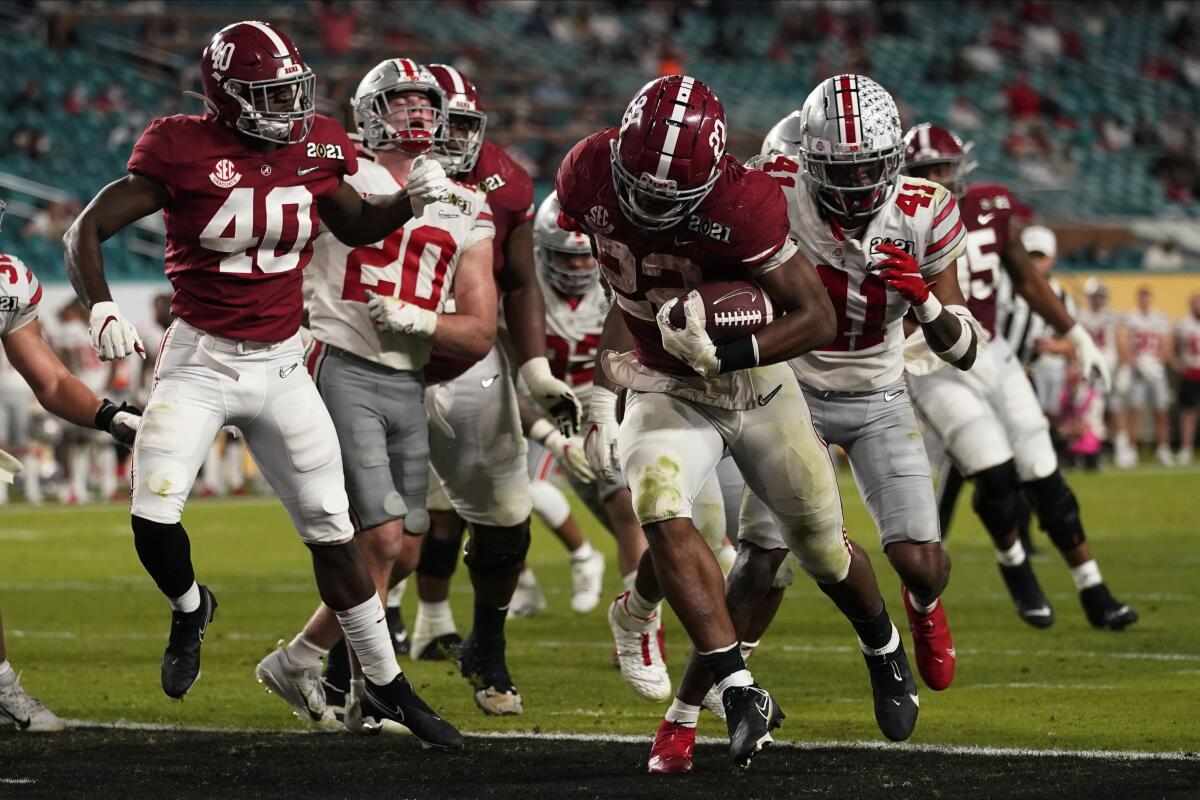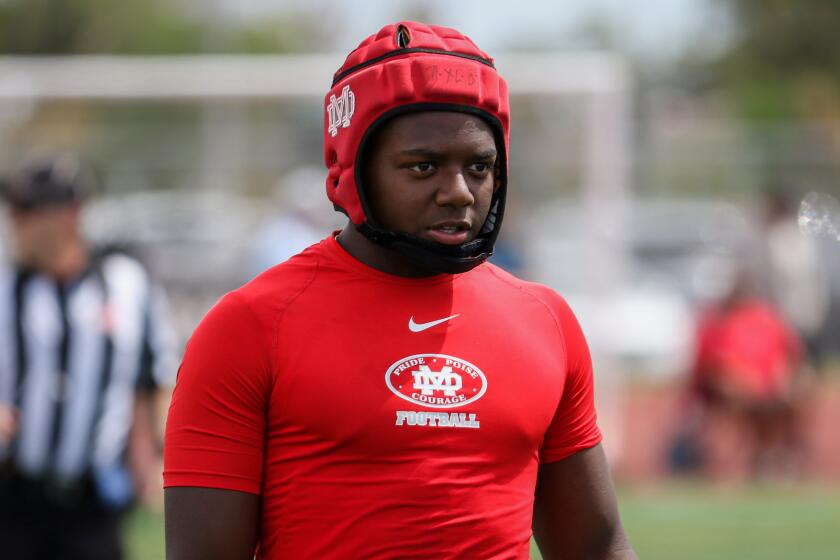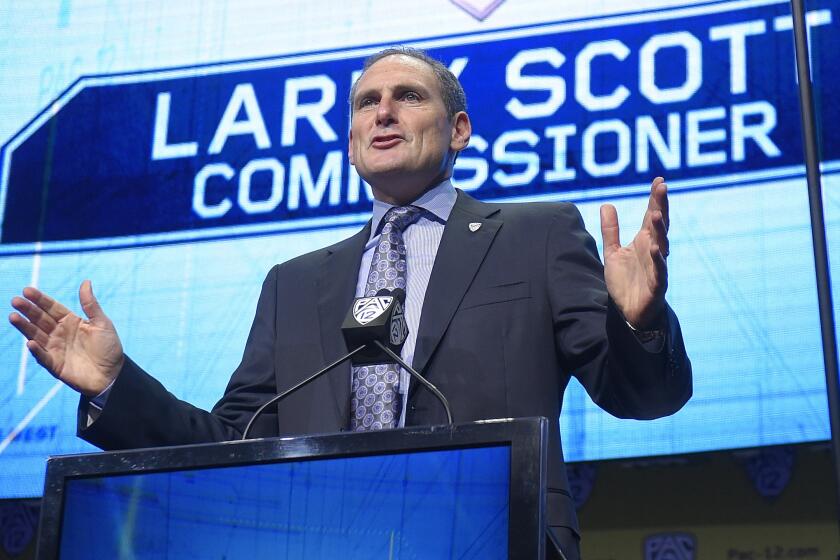The return of a college football video game broke Twitter. Why millennials can’t let go

A look back at NCAA Football 2014.
- Share via
We were summer interns, living in Tampa, Fla., fresh off our 21st birthdays, but Steve Jackson and I didn’t spend any time together in the city’s infamous Ybor City bar district, not after early July.
Throughout my teenage years, I would wait in line hours before the store opened on the release day for EA Sports’ NCAA Football series. It was no different that summer, even as I was supposed to be working to convince my editors at the Tampa Tribune to give me a real job. (They did not, and as you read further, that won’t surprise you.)
The first weekend after procuring our prize, Steve, a friend from college, and I went into hibernation, playing the game nonstop and dreaming of what that year’s Michigan football season would bring. The answer was more heartache, of course, but as we plowed through the Big Ten on his Playstation2 into the wee hours of the morning, we found an easy escape from reality.
The funny thing, looking back, is that this behavior felt perfectly normal to us. As the years went by, we would move on from the game to various degrees of separation, and, when EA Sports stopped making it in 2014 because of litigation from former players relating to the game’s use of their name, image and likeness, those of us who refused to let go were forced into taking stock of our life priorities.
But Tuesday morning, when EA Sports announced on Twitter, “For those who never stopped believing… College Football is coming back,” a generation of early-millennial sports nerds collectively felt a disturbance in the force.
Fittingly, the first text message I received was from Steve Jackson.
These days, Steve and I mostly converse about our college football and basketball fantasy leagues. Those avenues for distraction have grown in importance because of the discontinuation of NCAA Football, especially for Steve. While I gave up the game cold turkey in my mid-20s as part of an “I need to be more mature” quarter-life crisis, Steve stayed committed well into his 30s, participating in online dynasty leagues with friends and family.
After ranking 64th nationally in recruiting last year, USC is No. 8 this year, adding Santa Ana Mater Dei’s Raesjon Davis, a four-star prospect, on Wednesday.
On Wednesday, I called Steve, hoping to jog my memory. Why did we love the game so much, and why it has maintained a cult following among so many of our generation?
“This is the only game I kept playing after I had kids,” said Steve, who now lives outside of Minneapolis with his wife and two school-aged children.
“Playing video games feels like you’re a kid again. Especially going through this transition from college life to being an actual grownup, there’s a social animal to it. You stay connected to people that you otherwise wouldn’t. There are people, good friends of mine, that I don’t talk to anymore, not like I did, because our online dynasty fell apart.”
Many love the Madden NFL franchise, too, but the fervor for that game among its devotees never reached NCAA Football levels. That next-level hysteria is what makes college football entertaining in general, and the video game only helped to fuel that passion and accentuate the colors of fall.
Plus, it was much more fun to build a dynasty with Kansas, Purdue or Oregon State as a “head coach” who gets to sell recruits on your program than it was navigating the salary cap for a losing NFL franchise as a “general manager.”
Thor Nystrom, a sportswriter with Rotoworld, could be considered the king of the NCAA Football online dynasty universe. He remembers the exact date of the game’s last release — July 9, 2013 — and has continued to rally others to join him in playing NCAA Football 2014 for the last seven years on Playstation3 (there is now a Playstation5).
“I play three to four online dynasties at a time with guys from all over the country, different sportswriters, buddies from childhood, all kinds of people,” Thor told me. “It’s crazy the people that are just obsessed with this game.”

Back in college, my best friend, Jim Weber, doubled as my greatest nemesis in NCAA Football. As sophomores living off-campus for the first time, our house’s most normalized activity was sitting on the sofa watching our friends play one another, and to say we behaved sophomorically is an understatement. Jim used to relish beating me with South Carolina so he could make Gamecock crowing noises into my ear the entire game.
“The outrage, the anger, the arguments you would get in between friends was so hilarious,” Jim told me. “I still played a ton living with friends four years after college, then as soon as I moved into an apartment by myself, I brought my console, then trashed it. Once you can’t experience it with friends, it just wasn’t fun anymore.”
After reminiscing with Steve and Jim, I was able to pinpoint what drew me to the game. Sure, I enjoyed the social aspect and playing dynasty mode. But what I really loved was imagining that I was playing with the real players. That had always been the case, from the time I was 11 playing Bill Walsh College Football, running “Student Body” right and left with Georgia’s dominant running back, Garrison Hearst. College stars, growing up in the South, felt just as legendary as the pros.
I was too young to understand what was being taken from Hearst, who was only an avatar labeled “No. 5” due to NCAA rules prohibiting players from the use of their name, image and likeness. Twenty years later, this inequity led to former players, led by former Nebraska quarterback Sam Keller, suing the NCAA, which settled the case for $20 million. From there, EA Sports backed away from the game but always maintained it was ready to pay the players whenever schools would allow it.
After Tuesday’s tweet from EA Sports, the natural question was: So, what about the players? EA told ESPN that it was prepared to make the game without current player NILs if NCAA rules — or state or federal laws — did not approve their use. An agreement with the schools and conferences for their intellectual property through Collegiate Licensing Company (CLC) would provide EA with everything it needs to create a modern version of the game … except the identities of the young men who suit up on Saturdays?
Nystrom reminded me that there are third party companies that already take the time to update the rosters from the 2013 version into a file that can be purchased each year, giving EA Sports a readymade workaround for the player issue while the future of NIL is determined.
“Be a good person for once in your lives” is Nystrom’s demand of the NCAA.
The financial success of these third parties shows that the name on the back of the jersey is equally important to the name on the front, at least among the sport’s diehard fans.
Larry Scott and the Pac-12 announced they are parting ways at the end of June, ending the commissioner’s turbulent 11-year run.
“EA Sports’ college football series reboot is just further proof that the NCAA’s priority is keeping their profits coming while keeping any and all revenue away from their athletes,” Sen. Chris Murphy (D-Conn.) said in a statement Tuesday. “I’ll be introducing legislation soon to help players finally profit off their talent so they don’t need to face continued mistreatment like this.”
On Thursday Murphy released his proposal for a federal bill that would allow college athletes full use of their NIL and to have group licensing. Who knows what will come of it?
I told Steve that, as much as the idea of coming back to the game as I enter my 40s thrilled me, I wouldn’t start playing it again until players were included and compensated fairly.
Steve wasn’t going to go that far with any moral righteousness — and nor will legions of others.
“I’ll buy a whole new system to play,” Steve said. “I’ll make the time. I’ll change my life to get back into this. I care about this, and the other people who care about this, we’re going to fire this thing back up!”
More to Read
Go beyond the scoreboard
Get the latest on L.A.'s teams in the daily Sports Report newsletter.
You may occasionally receive promotional content from the Los Angeles Times.













